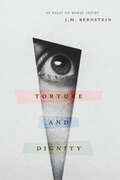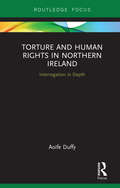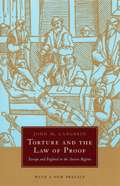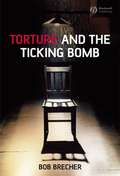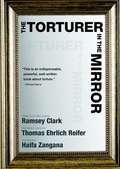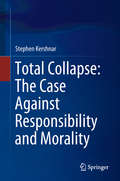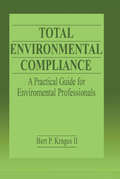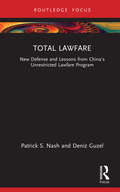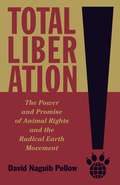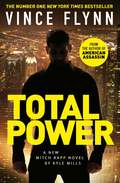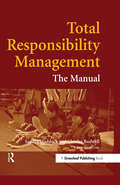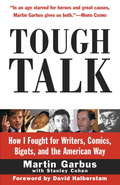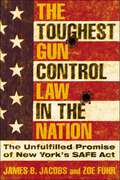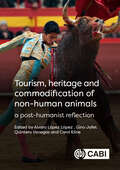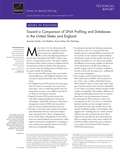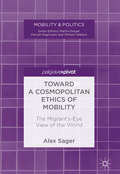- Table View
- List View
Torts!, third edition (The Open Casebook Series)
by Jonathan L. Zittrain Jordi WeinstockA law school casebook that maps the progression of the law of torts through the language and example of public judicial decisions in a range of cases.A tort is a wrong that a court is prepared to recognize, usually in the form of ordering the transfer of money (&“damages&”) from the wrongdoer to the wronged. The tort system offers recourse for people aggrieved and harmed by the actions of others. By filing a lawsuit, private citizens can demand the attention of alleged wrongdoers to account for what they&’ve done—and of a judge and jury to weigh the claims and set terms of compensation. This book, which can be used as a primary text for a first-year law school torts course, maps the progression of the law of torts through the language and example of public judicial decisions in a range of cases. Taken together, these cases show differing approaches to the problems of defining legal harm and applying those definitions to a messy world. The cases range from alleged assault and battery by &“The Schoolboy Kicker&” (1891) to the liability of General Motors for &“The Crumpling Toe Plate&” (1993). Each case is an artifact of its time; students can compare the judges&’ societal perceptions and moral compasses to those of the current era. This book is part of the Open Casebook series from Harvard Law School Library and MIT Press.
Torture and Dignity: An Essay on Moral Injury
by J. M. BernsteinIn this unflinching look at the experience of suffering and one of its greatest manifestations--torture--J. M. Bernstein critiques the repressions of traditional moral theory, showing that our morals are not immutable ideals but fragile constructions that depend on our experience of suffering itself. Morals, Bernstein argues, not only guide our conduct but also express the depth of mutual dependence that we share as vulnerable and injurable individuals. Beginning with the attempts to abolish torture in the eighteenth century, and then sensitively examining what is suffered in torture and related transgressions, such as rape, Bernstein elaborates a powerful new conception of moral injury. Crucially, he shows, moral injury always involves an injury to the status of an individual as a person--it is a violent assault against his or her dignity. Elaborating on this critical element of moral injury, he demonstrates that the mutual recognitions of trust form the invisible substance of our moral lives, that dignity is a fragile social possession, and that the perspective of ourselves as potential victims is an ineliminable feature of everyday moral experience.
Torture and Human Rights in Northern Ireland: Interrogation in Depth
by Aoife DuffyThis book presents a compelling and highly sophisticated politico-legal history of a particular security operation that resulted in one of the most high-profile torture cases in the world. It reveals the extent to which the Ireland v. United Kingdom judgment misrepresents the interrogation system that was developed and utilised in Northern Ireland. Finally, the truth about the operation is presented in a comprehensive narrative, sometimes corroborating secondary literature already in the public domain, but at other times significantly debunking aphorisms, or, indeed, lies that circulated about interrogation in depth. The book sets out the theoretical reference paradigm with respect to the culture and practice of state denial often associated with torture, and uses this model to excavate the buried aspects of this most famous of torture cases. Through the lens of a single operation, conducted twice, it presents a fascinating exposé of the complicated structures of state-sponsored denial designed to hide the truth about the long-term effects of these techniques and the way in which they were authorised.
Torture and the Law of Proof: Europe and England in the Ancien Régime
by John H. LangbeinIn Torture and the Law of Proof John H. Langbein explores the world of the thumbscrew and the rack, engines of torture authorized for investigating crime in European legal systems from medieval times until well into the eighteenth century. Drawing on juristic literature and legal records, Langbein's book, first published in 1977, remains the definitive account of how European legal systems became dependent on the use of torture in their routine criminal procedures, and how they eventually worked themselves free of it. The book has recently taken on an eerie relevance as a consequence of controversial American and British interrogation practices in the Iraq and Afghanistan wars. In a new introduction, Langbein contrasts the "new" law of torture with the older European law and offers some pointed lessons about the difficulty of reconciling coercion with accurate investigation. Embellished with fascinating illustrations of torture devices taken from an eighteenth-century criminal code, this crisply written account will engage all those interested in torture's remarkable grip on European legal history.
Torture and the Ticking Bomb (Blackwell Public Philosophy Series)
by Bob BrecherThis timely and passionate book is the first to address itself to Harvard Law Professor Alan Dershowitz’s controversial arguments for the limited use of interrogational torture and its legalisation. Argues that the respectability Dershowitz's arguments confer on the view that torture is a legitimate weapon in the war on terror needs urgently to be countered Takes on the advocates of torture on their own utilitarian grounds Timely and passionately written, in an accessible, jargon-free style Forms part of the provocative and timely Blackwell Public Philosophy series
The Torture of Children During Armed Conflicts
by Sonja C. GroverThis book examines selected legal complexities of the notion of torture and the issue of the proper foundation for legally characterizing certain acts as torture, especially when children are the targeted victims of torture. ICC case law is used to highlight the International Criminal Court's reluctance in practice to prosecute as a separable offence the crime of torture as set out in one or more of the relevant provisions of the Rome Statute where children are the particularized targets as part of a common plan during armed conflict. Also addressed is the failure of the ICC to consider that the young age of the victims of torture (i. e. children) should be an aggravating factor taken into account in determining the ICC sentence for those convicted of the torture of civilians, including children, in the context of armed conflict as part of a common plan. The six UN-designated grave crimes against children (including child soldiering for State or non-State forces perpetrating mass atrocities, and sexual violence perpetrated on a systematic and widespread basis against children including child soldiers), it is argued, are also instances of the torture of children as part of a common plan such that separate charges of torture are legally supportable (along with the other charges relating to additional Rome Statute offences involved in such circumstances). Useful legal perspectives on the issue of the torture of children in its various manifestations gleaned from the case law of other international judicial forums such as the Inter-American Court of Human Rights and the ICTY are also examined.
Torture, Power, and Law
by David LubanThis volume brings together the most important writing on torture and the 'war on terror by one of the leading US voices in the torture debate. Philosopher and legal ethicist David Luban reflects on this contentious topic in a powerful sequence of essays including two new and previously unpublished pieces. He analyzes the trade-offs between security and human rights, as well as the connection between torture, humiliation, and human dignity, the fallacy of using ticking bomb scenarios in debates about torture, and the ethics of government lawyers. The book develops an illuminating and novel conception of torture as the use of pain and suffering to communicate absolute dominance over the victim. Factually stimulating and legally informed, this volume provides the clearest analysis to date of the torture debate. It brings the story up to date by discussing the Obama administration's failure to hold torturers accountable.
The Torturer in the Mirror
by Haifa Zangana Ramsey Clark Thomas Ehrlich ReiferBefore the US invasion of Iraq, before the American public saw the infamous photos from Abu Ghraib, the CIA went to the White House with a question: What, according to the Constitution, was the line separating interrogation from torture--and could that line be moved? The White House lawyers' answer--in the form of legal documents later known as the "Torture Memos"--became the US's justification for engaging in torture. The Torturer in the Mirror shows us how when one of us tortures, we are all implicated in the crime. In three uncompromising essays, Iraqi dissident Haifa Zangana, former US Attorney General Ramsey Clark, and professor of sociology Thomas Ehrlich Reifer teach us how physically and psychologically insidious torture is, how deep a mark it leaves on both its victims and its practitioners, and how necessary it is for us as a society to hold torturers accountable.
Total Collapse: The Case Against Responsibility and Morality
by Stephen KershnarThis book argues that there is no morality and that people are not morally responsible for what they do. In particular, it argues that what people do is neither right nor wrong and that they are neither praiseworthy nor blameworthy for doing it. Morality and moral responsibility lie at the heart of how we view the world. In our daily life, we feel that people act rightly or wrongly, make the world better or worse, and are virtuous or vicious. These policies are central to our justifying how we see the world and treat others. In this book, the author argues that our views on these matters are false. He presents a series of arguments that threaten to undermine our theoretical and practical worldviews. The philosophical costs of denying moral responsibility and morality are enormous. It does violence to philosophical positions that many people took a lifetime to develop. Worse, it does violence to our everyday view of people. A host of concepts that we rely on daily (praiseworthy, blameworthy, desert, virtue, right, wrong, good, bad, etc.) fail to refer to any property in the world and are thus deeply mistaken. This book is of interest to philosophers, lawyers, and humanities professors as well as people interested in morality, law, religion, and public policy.
Total Environmental Compliance: A Practical Guide for Environmental Professionals
by Bert P. Krages IITotal Environmental Compliance: A Practical Guide for Environmental Professionals gives you the background and skills you need to ensure total environmental compliance in your organization. Instead of dryly describing theoretical management systems or reciting regulatory provisions, the author delves into the challenging issues of why organizations
Total Justice
by Lawrence M. FriedmanIt is a widely held belief today that there are too many lawsuits, too many lawyers, too much law. As readers of this engaging and provocative essay will discover, the evidence for a "litigation explosion" is actually quite ambiguous. But the American legal profession has become extremely large, and it seems clear that the scope and reach of legal process have indeed increased greatly. How can we best understand these changes? Lawrence Friedman focuses on transformations in American legal culture—that is, people's beliefs and expectations with regard to law. In the early nineteenth century, people were accustomed to facing sudden disasters (disease, accidents, joblessness) without the protection of social and private insurance. The uncertainty of life and the unavailability of compensation for loss were mirrored in a culture of low legal expectations. Medical, technical, and social developments during our own century have created a very different set of expectations about life, again reflected in our legal culture. Friedman argues that we are moving toward a general expectation of total justice, of recompense for all injuries and losses that are not the victim's fault. And the expansion of legal rights and protections in turn creates fresh expectations, a cycle of demand and response. This timely and important book articulates clearly, and in nontechnical language, the recent changes that many have sensed in the American legal system but that few have discussed in so powerful and sensible a way. Total Justice is the third of five special volumes commissioned by the Russell Sage Foundation to mark its seventy-fifth anniversary.
Total Lawfare: New Defense and Lessons from China’s Unrestricted Lawfare Program
by Patrick S. Nash Deniz GuzelThis book advocates for a novel doctrine of ‘total lawfare’ as part of a comprehensive approach to modern hybrid warfare.The book begins by introducing the military concept of ‘limited lawfare’ in the context of modern geopolitical conditions. It proceeds to set out a conceptual history of lawfare in the West, highlighting conceptual shortcomings and NATO’s limited capabilities in this branch of hybrid warfare. It then provides a comparative case study and strategic threat assessment of the Chinese concept of ‘unrestricted lawfare’. Against this, the book grounds an ethical doctrine of ‘total lawfare’ within the Western jurisprudential tradition and translates this into practice as a key pillar of modern defense strategy under the rule of law. The book concludes by advocating for a Thielian ‘New Defense’ industry centered upon ‘total lawfare’ as a legitimate and effective Western response to enemy aggression.The book will be of interest to academics, policy-makers, and students working in the fields of lawfare, jurisprudence, and military law.
Total Liberation: The Power and Promise of Animal Rights and the Radical Earth Movement
by David Naguib PellowWhen in 2001 Earth Liberation Front activists drove metal spikes into hundreds of trees in Gifford Pinchot National Forest, they were protesting the sale of a section of the old-growth forest to a timber company. But ELF&’s communiqué on the action went beyond the radical group&’s customary brief. Drawing connections between the harms facing the myriad animals who make their home in the trees and the struggles for social justice among ordinary human beings resisting exclusion and marginalization, the dispatch declared, &“all oppression is linked, just as we are all linked,&” and decried the &“patriarchal nightmare&” in the form of &“techno-industrial global capitalism.&” In Total Liberation, David Naguib Pellow takes up this claim and makes sense of the often tense and violent relationships among humans, ecosystems, and nonhuman animal species, expanding our understanding of inequality and activists&’ uncompromising efforts to oppose it. Grounded in interviews with more than one hundred activists, on-the-spot fieldwork, and analyses of thousands of pages of documents, websites, journals, and zines, Total Liberation reveals the ways in which radical environmental and animal rights movements challenge inequity through a vision they call &“total liberation.&” In its encounters with such infamous activists as scott crow, Tre Arrow, Lauren Regan, Rod Coronado, and Gina Lynn, the book offers a close-up, insider&’s view of one of the most important—and feared—social movements of our day. At the same time, it shows how and why the U.S. justice system plays to that fear, applying to these movements measures generally reserved for &“jihadists&”—with disturbing implications for civil liberties and constitutional freedom. How do the adherents of &“total liberation&” fight oppression and seek justice for humans, nonhumans, and ecosystems alike? And how is this pursuit shaped by the politics of anarchism and anticapitalism? In his answers, Pellow provides crucial in-depth insight into the origins and social significance of the earth and animal liberation movements and their increasingly common and compelling critique of inequality as a threat to life and a dream of a future characterized by social and ecological justice for all.
Total Petroleum Hydrocarbons: Environmental Fate, Toxicity, and Remediation
by Saranya Kuppusamy Naga Raju Maddela Mallavarapu Megharaj Kadiyala VenkateswarluThe term “total petroleum hydrocarbons” (TPHs) is used for any mixture of several hundred hydrocarbons found in crude oil, and they represent the sum of volatile petroleum hydrocarbons and extractable petroleum hydrocarbons. The petrol-range organics include hydrocarbons from C6 to C10, while diesel-range organics are C10-C28 hydrocarbons. Environmental pollution by petroleum hydrocarbons is one of the major global concerns, particularly in oil-yielding countries. In fact, there are more than five million potentially contaminated areas worldwide that represent, in general, a lost economic opportunity and a threat to the health and well-being of humans and the environment. Petroleum-contaminated sites constitute almost one-third of the total sites polluted with chemicals around the globe. The land contamination caused by industrialization was recognized as early as the 1960s, but less than a tenth of potentially contaminated lands have been remediated due to the nature of the contamination, cost, technical impracticability, and insufficient land legislation and enforcement. This book is the first single source that provides comprehensive information on the different aspects of TPHs, such as sources and range of products, methods of analysis, fate and bioavailability, ecological implications including impact on human health, potential approaches for bioremediation such as risk-based remediation, and regulatory assessment procedures for TPH-contaminated sites. As such, it is a valuable resource for researchers, graduate students, technicians in the oil industry and remediation practitioners, as well as policy makers.
Total Power (The Mitch Rapp Series #19)
by Kyle Mills Vince FlynnWhen terrorists take out the entire US power grid, it's a race against the clock to prevent chaos in this compulsive thriller, part of the New York Times bestselling Mitch Rapp series.&‘Suspenseful, strikingly original&’ Publishers Weekly&‘Proves once again that the Mitch Rapp series is &“the best in the world when it comes to special ops&”&’ Booklist Captured by Mitch Rapp, ISIS&’s top technology expert reveals that he was about to meet a man who could bring down America&’s power grid. When the CIA trap to eliminate this man fails, ISIS operatives help the cyber terrorist do what he said he would – plunge the country into darkness. With no concept of how this unprecedented act was accomplished, the task of getting the power back on could take months, or even years. Computers and phone networks are down, petrol pumps are inoperable, even water systems and food supplies are struggling. With resources suddenly gone and America on the brink of collapse, Rapp and his team embark on a mission to find the only people who can repair the damage – the ones who caused it. But this is unlike anything he&’s experienced before and time is running out . . .Can Rapp get the lights back on before it's too late?Praise for the Mitch Rapp series 'Sizzles with inside information and CIA secrets' Dan Brown 'A cracking, uncompromising yarn that literally takes no prisoners' The Times 'Vince Flynn clearly has one eye on Lee Child's action thriller throne with this twist-laden story. . . instantly gripping' Shortlist 'Action-packed, in-your-face, adrenalin-pumped super-hero macho escapist fiction that does exactly what it says on the label' Irish Independent 'Mitch Rapp is a great character who always leaves the bad guys either very sorry for themselves or very dead' Guardian 'Outstanding . . . Mills is writing at the top of his game' Publishers Weekly
Total Responsibility Management: The Manual
by Sandra Waddock Charles BodwellAlmost every manager today knows that satisfying customers by meeting their quality demands is a critical component of business success. Quality management is a given in modern companies – a competitive imperative. Yet it was not always so. Back when the quality movement was getting started, few managers really understood either the importance of quality to customers or how to manage for quality. Much the same could be said today about managing responsibility. Why and how should responsibility be managed? What is responsibility management? Total Responsibility Management answers these questions while at the same time providing a systemic framework for managing a company's responsibilities to stakeholders and the natural environment that can be applied in a wide range of contexts. This framework uses managerial familiarity with quality management to illustrate the drivers for responsibility management. Companies know that product or service quality affects their customer relationships and the trust customers have in the company's products and services. So, too, a company's management of its responsibilities to other constituencies affects its relationships with those other stakeholders and the natural environment. But why bother? The answer is quite simple. Never has it been easier for employees, reporters, activists, investors, community members, the media and other critical observers to find fault with companies and their subsidiaries. A problem identified, even in a remote region or within a remote supplier, can instantaneously be transmitted around the world at the click of a mouse. Ask footwear, toy, clothing and other highly visible branded companies what their recent experience with corporate critics has been and they will tell you about the need to manage their stakeholder responsibilities (human rights, labour relations, environmental, integrity-related) or face significant consequences in the limelight of public opinion. Managers will discover that whether they do it consciously or not, they are already managing responsibility, just as companies were already managing quality when the quality movement hit. This manual makes the process of managing responsibilities to and relationships with stakeholders and nature explicit. Making the process explicit is important because too few of today's decisions-makers yet understand how they are managing stakeholder responsibilities as well as they understand how to manage quality. Managing responsibilities goes well beyond traditional 'do good' or discretionary activities associated with philanthropy and volunteerism, which are frequently termed 'corporate social responsibility'. In its broadest sense, responsibility management means taking corporate citizenship seriously as a core part of the way the company develops and implements its business model. The specifics of responsibility management are unique to each company, its industry, its products and its stakeholders, yet, as this manual illustrates, a general approach to managing responsibility is feasible – indeed, is increasingly necessary. Based on work undertaken by Boston College and the International Labour Office, Total Responsibility Management is the first CSR manual. Its original case studies add value to a range of tools and exercises that will make it required reading for all managers in need of a practical guide to managing responsibility and to students and researchers looking for an overarching framework to contextualise the changing responsibilities of global business.
Touched with Fire: Morris B. Abram and the Battle against Racial and Religious Discrimination
by David E. LoweMorris B. Abram (1918–2000) emerged from humble origins in a rural South Georgia town to become one of the leading civil rights lawyers in the United States during the 1950s. While unmasking the Ku Klux Klan and serving as a key intermediary for the release of the Rev. Martin Luther King Jr. from prison on the eve of the 1960 presidential election, Abram carried out a successful fourteen-year battle to end the discriminatory voting system in his home state, which had entrenched racial segregation. The result was the historic &“one man, one vote&” ruling of the U.S. Supreme Court in 1963. At the time of his selection—the youngest person ever chosen to head the American Jewish Committee—Abram became a leading international advocate for the Jewish state of Israel. He was also a champion of international human rights, from his leadership in the struggle to liberate Soviet Jewry to his service as permanent representative to the United Nations in Geneva. In Touched with Fire David E. Lowe chronicles the professional and personal life of this larger-than-life man. Encompassing many of the contentious issues we still face today—such as legislative apportionment, affirmative action, campus unrest, and the enforcement of international human rights— Abram&’s varied career sheds light on our own troubled times. Abram was tapped for service by five different U.S. presidents and survived a battle with acute myelocytic leukemia. He never abandoned his belief that the United States might someday become a colorblind society, where people would be judged, as his friend Martin Luther King dreamed, not by the color of their skin but by the content of their character. This elegantly written book is the biography Abram has long deserved.
Toufah: The Woman Who Inspired an African #MeToo Movement (Eyewitness Memoirs)
by Toufah Jallow Kim Pittaway*One of The Most Anticipated Books of Fall 2021 (Kirkus Reviews, Publishers Weekly)* "This powerful story shouldn&’t be missed." —Publishers Weekly (starred review) An incandescent and inspiring memoir of resilience from a courageous young woman whose powerful advocacy brings to mind the presence, resolve, and moral authority of Amanda Gorman and Greta ThunbergBefore launching an unprecedented protest movement, Toufah Jallow was just a 19-year-old dreaming of a scholarship. Encouraged by her mother to pursue her own ambitions, Toufah entered a presidential competition purportedly designed to identify the country's smart young women and support their educational and career goals. Toufah won. Yahya Jammeh, the dictator who had ruled The Gambia all of Toufah's life, styled himself as a pious yet progressive protector of women. At first he behaved in a fatherly fashion toward Toufah, but then proposed marriage, and she turned him down. On a pretext, his female cousin then lured Toufah to the palace, where he drugged and raped her. Toufah could not tell anyone. There was literally no word for rape in her native language. If she told her parents, they would take action, and incur Jammeh's wrath. Wearing a niqab to hide her identity, she gave Jammeh&’s security operatives the slip and fled to Senegal. Her eventual route to safety in Canada is full of close calls and intrigue. 18 months after Jammeh was deposed, Toufah Jallow became the first woman in The Gambia to make a public accusation of rape against him, sparking marches of support and a social media outpouring of shared stories among West African women under #IAmToufah. Each brave and bold decision she made set Toufah on the path to reclaim the personal growth and education that Jammeh had tried to steal from her, a future also of leadership and advocacy for survivors of sexual violence, especially in heavily patriarchal countries lacking resources and laws to protect women and even the language with which to speak openly about sexual threats and violence.
Tough Talk: How I Fought for Writers, Comics, Bigots, and the American Way
by Martin Garbus Stanley CohenThe boisterous freedom promised by the First Amendment is both the heart of American experiment and the fissure along which it divides itself. Those who would fight freedom's enemies, from political correctness to corporate intimidation to outright censorship, face powerful adversaries. But they also have a potent weapon at their disposal: good, old-fashioned talk--tough talk. And as one of America's leading First Amendment attorneys, Martin Garbus is one of the toughest talkers there is. Starting with his work on the tam that defended the legendary satirist Lenny Bruce against obscenity charges, Garbus has been a fearless advocate for some of the most important voices of our time, among them union organizer Cesar Chavez, actor Robert Redford, director Spike Lee, writer Samuel Beckett, Russian dissident Andrei Sakharov, and Czech playwright Vaclav Havel, who, as president of his country's revolutionary government, invited Garbus to help write the nation's constitution. But Garbus is not an ivory-tower theoretician. He is a highly effective defense lawyer who takes on cases with the full intent of winning. In Tough Talk, Garbus goes behind the scenes to show us how our system really works and what he does to make it work for his clients. How does an attorney get controversial cases? What does he do to gain control of a hostile courtroom? How does he work with a defendant whose beliefs are the opposite of his own? Tough Talk is both the story of one man's battle for freedom and a clear-eyed account of every major First Amendment issue this nation has faced in the last three decades, for the battles Garbus has fought have become the touchstones of America's debate about the limits of freedom. In showing us how he has harnessed his personal idealism to the gritty reality of the courtroom, Garbus gives brilliant testimony to the power of tough talk.
The Toughest Gun Control Law in the Nation: The Unfulfilled Promise of New York's SAFE Act
by James B. Jacobs Zoe FuhrA comprehensive assessment of real gun reform legislation with recommendations for better design, implementation and enforcementA month after the Sandy Hook Elementary School shooting, New York State passed, with record speed, the first and most comprehensive state post-Sandy Hook gun control law. In The Toughest Gun Control Law in the Nation, James B. Jacobs and Zoe Fuhr ask whether the 2013 SAFE Act —hailed by Governor Andrew Cuomo as “the nation’s toughest gun control law” – has lived up to its promise. Jacobs and Fuhr illuminate the gap between gun control on the books and gun control in action. They argue that, to be effective, gun controls must be capable of implementation and enforcement. This requires realistic design, administrative and enforcement capacity and commitment and ongoing political and fiscal support. They show that while the SAFE Act was good symbolic politics, most of its provisions were not effectively implemented or, if implemented, not enforced. Gun control in a society awash with guns poses an immense regulatory challenge. The Toughest Gun Control Law in the Nation takes a tough-minded look at the technological, administrative, fiscal and local political impediments to effectively keeping guns out of the hands of dangerous persons and eliminating some types of guns altogether.
Tourism and Culture in Philosophical Perspective
by Marie-Élise Zovko John DillonThis book offers a philosophical approach to tourism as a permanent factor in the lifestyle, economy, and culture of the contemporary global community. Travel to well-known destinations and pursuit of an ever-increasing range of leisure activities are an aspiration of most humans today. Those not themselves engaged in tourist activities are quite often involved in providing the goods and services which make tourism possible. Yet the ill effects of mass tourism and overtourism on sensitive ecosystems, resources, and community life have begun to outweigh economic gains, threatening to destroy destinations, cultural heritage, and livelihoods. The editors and contributors of this collection reflect on the nature and meaning of tourism, its history, elements, and forms, the roles of tourist and host, the limits of hospitality, tendencies to excess and the reasons why we engage in such forms of behaviour, and the place of tourism in human culture as a whole. By shedding light on these questions, more efficacious solutions to the urgent problems raised by the practice of tourism can be found. This work is a must-read for scholars, teachers, and students engaged in study and research on philosophy of culture, philosophical anthropology, tourist and destination management, human factors engineering, and sustainability.
Tourism, Heritage and Commodification of Non-human Animals: A Posthumanist Reflection
by Tomas Arias Jean Azcatl Pineda Alicia Mariana Pérez Bobbie Chew Bigby Émilie Crossley Johan Edelheim Georgina Flores Carolin Funck Leonardo Garavito-González Yulei Guo Dr Jes Hooper Brenda Martínez Velasco Alejandro Morales Gustavo Ortiz-Millán Mateo Nicolás Medina Jorge Iván Barrera Javed Salim Estephania Sepúlveda Perdomo Rie Usui David A. Varela-Trejo Nusrat YasmeenHeritage is a social construction rooted in modern and contemporary societies. It is commonly a positive assessment of many elements of the physical and human environment (e.g. ecosystems and landscapes, monuments, customs, gender norms, religious practices, gastronomy, and livelihoods). Heritage and tourism are strongly related to each other in that heritage gives rise to tourist attractions and activities, and tourism enhances the designation of heritage sites. Non-human animals (hereafter 'animals') are present as implicit or explicit heritage elements through multiple tourist environments: animals may be themselves the heritage focus of tourist interest (visual arts, gastronomy, as charismatic and distinguished beings, as part of festivities or rituals), or it may be that animals are agents involved in heritage tourist environments such as working animals or in recreational activities. A post-humanist perspective the moral valuation of equality between humans and other animals demands that both are sentient beings and self-aware of their pain and pleasure. Thus, the involvement of animals as heritage elements by themselves or as an element of tourist consumption in heritage sites implies their commodification and lack of agency. As such, these practices are usually unethical, since they threaten the animals' primary interests: not to suffer, not to feel pain and to be able to live their freedom. This book contains chapters that reveal both the unethical interactions between humans and animals within heritage tourism, and those that show experiences in which efforts are made to minimize damage within the commercialization of animals involved as heritage themselves. It will be of interest to postgraduate students, academics, NGOs and tourism planners.
Toward a Comparison of DNA Profiling and Databases in the United States and England
by Paul Steinberg Carl Matthies Emma Disley Jeremiah GoulkaRAND researchers explored the U.S. and English forensic DNA analysis systems to find out whether England has capitalized more fully on their crime-fighting potential than the U.S. system, processing samples more quickly and providing more database hits for law enforcement.
Toward a Conceptual Network for the Private Law of Artificial Intelligence (Law, Governance and Technology Series #51)
by Paweł Księżak Sylwia WojtczakThis book provides a set of proposals for the new conceptual network required in order to establish civil law rules for a world permeated by Artificial Intelligence. These proposals are intended by their authors to push the debate on the new civil law forward. In spite of the natural conservatism of jurists, some innovative or even futuristic ideas are called for, also because the future, even this not-so-distant one, is difficult to foresee. Paradoxically, and unlike in the past, this lack of knowledge must not stop us from planning. If it does, humankind may, as some pessimists already claim, lose its chance to win the battle for control of the world.The rise and expansion of Artificial Intelligence and robotics in recent years has highlighted a pressing need to create a suitable legal framework for this new phenomenon. The debate on the subject, although wide-ranging and involving many new legal documents, is still quite general and preliminary in nature, although these preparatory works illustrate the very real need to develop appropriate new civil law arrangements. It is exactly the branch of private law where the necessity of these new rules appears to be the most imperative. Autonomous vehicles, medical robots, and expertise software raise fundamental questions on aspects of civil liability such as culpability; whereas the growth in popularity of automated, intelligent software systems for concluding contracts requires a new approach to many fundamental and deeply rooted elements of contract law, e.g. consciousness, intent, error, deception, interpretation of contracts and good faith. Ruling on these specific matters demands the identification and clarification of certain key points, which shall become the foundation for constructing AI/robot civil law.
Toward a Cosmopolitan Ethics of Mobility: The Migrant's-Eye View of the World (Mobility & Politics)
by Alex SagerThis book proposes a cosmopolitan ethics that calls for analyzing how economic and political structures limit opportunities for different groups, distinguished by gender, race, and class. The author explores the implications of criticisms from the social sciences of Eurocentrism and of methodological nationalism for normative theories of mobility. These criticisms lend support to a cosmopolitan social science that rejects a principled distinction between international mobility and mobility within states and cities. This work has interdisciplinary appeal, integrating the social sciences, political philosophy, and political theory.

